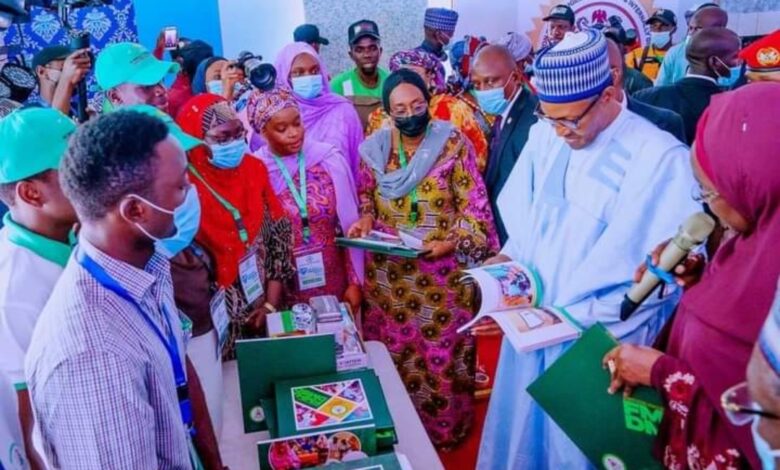Boko Haram Conflict: Widows, Orphans, Unexploded Ordinance Emerging Issues, Says Buhari
He raised the concerns during a visit to Maiduguri, where he joined humanitarian aid workers in celebrating World Humanitarian Day.

Nigeria’s President Muhammadu Buhari has urged the military and the Ministry of Humanitarian Affairs to pay attention to emerging issues as the insurgency in the Northeast shifts into the post-conflict phase.
On Thursday, Aug. 18, he listed the rising numbers of widows and orphans and the dangers of unexploded ordnance in communities where internally displaced persons (IDPs) are resettled as new challenges for those managing the conflict.
He raised the concerns when he visited Maiduguri, where he joined humanitarian aid workers on the frontline in celebrating the 2022 World Humanitarian Day.
The President praised the humanitarian workers for risking their lives and safety in trying to make displaced persons regain their dignity and comfort.
He called on the Ministry of Humanitarian Affairs and the Northeast Development Commission (NEDC) to “pay particular attention to emerging issues as we seek to return and rehabilitate our people”.
He said the emerging issues “include the increasing number of orphans and widows and the existence of unexploded ordnances”.
“From our experience in the unfortunate civil war, there is a graver threat the unexploded ordinances can cause to returnees even after the conflict has ended, as we saw in the latest IED explosions in Bama just last month,” he said.
“I urge the ministry and its agencies as well as state governments and the technical committees that I have set up under the chairmanship of my vice president to come up with specific programmes and projects that respond to the emerging challenges of the explosive ordinance as well as children orphaned by the insurgency.”
Asides the Bama incident that killed 13 scrap scavengers, another explosion on Aug. 10 injured four children in Ngala, a town near the shores of Lake Chad.
The President commended humanitarian aid workers for providing “the needed humanitarian assistance and support to those afflicted by the conflict.”
“Even as they are faced with an unprecedented scale of challenges, humanitarian aid workers across the globe continue to show their courage and commitment to do their jobs, often at extreme possible risk to themselves,” he remarked.
Buhari had also, during the visit, commissioned projects executed by the Borno state government, including a housing estate meant for school teachers who had survived attacks during the insurgency.
Speaking earlier, the minister of humanitarian affairs, Sadiya Umar-Farouq, said in line with the theme of the year’s World Humanitarian Day, “It truly takes a village to provide emergency relief, protection and assistance, to build peace and resilience of affected communities, to promote sustainable development and to lift people out of poverty, especially in complex and protracted humanitarian situations.”
Support Our Journalism
There are millions of ordinary people affected by conflict in Africa whose stories are missing in the mainstream media. HumAngle is determined to tell those challenging and under-reported stories, hoping that the people impacted by these conflicts will find the safety and security they deserve.
To ensure that we continue to provide public service coverage, we have a small favour to ask you. We want you to be part of our journalistic endeavour by contributing a token to us.
Your donation will further promote a robust, free, and independent media.
Donate HereStay Closer To The Stories That Matter




